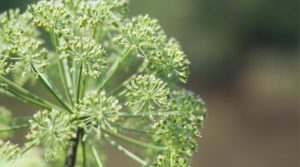Angelica sinensis is a plant that grows in cool high altitude mountains in China, Japan, and Korea.
Contents
Uses
- Widely used in Chinese traditional medicine for women’s health, cardiovascular conditions, osteoarthrosis, inflammation, headache, infections, mild anemia, fatigue and high blood pressure.
Benefits
- This herbal remedy is very often suggested to patients by many modern herbalists to be used in the treatment of the majority of gynecological ailments and disorders, these conditions can include persistent menstrual cramps, the presence of some irregularity or a retarded menstrual flow, and to treat physical weakness during the menstrual period of affected women.
- While the use of the dong quai is not suggested in pregnant women, the remedy is also said provide physical relief from the many symptoms which occur during the process of menopause in women.
- The remedy is also known to be useful in the treatment of disorders such as hypertension and additionally, it is said to possess very effective antispasmodic properties in individuals afflicted by muscular spasms.
- The herb is also used to induce blood purification and to provide nourishment, for which it has a great reputation-and lastly, it has also been used in the treatment of constipation in individuals affected by this disorder.
- The nourishing effects of the Chinese angelica, it high content of major vitamins, and its actions and aid in the absorption and utilization of the vitamin E from the diet are other beneficial properties. Remedies made from the Chinese angelica are also utilized to control and treat disorders such as anemia and the angina which affects the heart.
Cautions
- Generally, the Angelica Polymorpha Sinensis is considered by herbalist as an extremely low toxicity remedy. Though, it can induce minor problems in individuals, causing some fair-skinned individuals to become more sensitive to direct sunlight on the skin. For this reason and to avoid this effect, all individuals who make use of the remedy on a regular basis should try to avoid any prolonged and direct exposure to the sun or to other sources of ultraviolet radiation from day to day while treatment is progressing. Pregnant and lactating women must not use the dong quai and most herbalists will suggest discontinuance on starting a term of pregnancy.
Other Names
Angelica China, Angelica sinensis, Angelica polymorpha var. sinensis, Angelicae Gigantis Radix, Angélique Chinoise, Angélique de Chine, Chinese Angelica, Dang Gui, Danggui, Danguia, Don Quai, Kinesisk Kvan, Ligustilides, Radix Angelicae Gigantis, Radix Angelicae Sinensis, Tang Kuei, Tan Kue Bai Zhi, Tanggwi, Toki
References
Source:
Wikipedia, https://en.wikipedia.org/wiki/Angelica_sinensis
Herbs2000, http://www.herbs2000.com/herbs/herbs_angelica_chinese.htm
Image source: https://www.indigo-herbs.co.uk/shop/buy/dong-quai-tincture-powder

